![[Home]](https://ludism.org/logo/sclogo160.png)
CAREFUL! IF YOU ARE TOLD THIS PAGE IS LOCKED, DO NOT TRY TO EDIT IT. IF YOU ARE EDITING IT AND WOULD LIKE TO KEEP IT LOCKED FOR MORE THAN 10 MINUTES, CLICK THE "PREVIEW" BUTTON.
Seattle Cosmic had its first trial game night that was hosted by Ben Sklar on the last day of January 2004. Ben has a beautiful condominium in Kenmore. It is very clean and spacious, with cathedral ceilings, and noise was not much of an issue because of the layout of the space. Unfortunately, Ben only had three tables, so people sometimes had to resort to playing on the floor, parking was something of a problem (so I hear), and because Ben's condo is up two long flights of stairs, accessibility for people with mobility problems was something of an issue. The major problem, lack of tables, could easily be solved if Ben brought in three or four card tables, which could be stowed somewhere easily on non-game nights. If people want to discuss other issues, we should probably do so on the mailing list.
Attending last night were 17 people as I make it, which is pretty good for the first night at a new place. Present were Ben_Sklar? (host), ChadUrsoMcDaniel, Jay_Lorch? and MichelleTeague?, Timothy_Higgins?, Alex_Rockwell?, Steve_Dupree? and Nat_Dupree?, Alex_Rockwell?, Kayne_McGladrey? and Jennifer_McGladrey?, and John_Reiher?. Ron_Hale-Evans? (yours truly), Marty_Hale-Evans?, and John_Braley? arrived around 6:20 PM, and another party consisting of Dave_Howell?, Eric_Yarnell,_ND? and Mark_Haggerty? arrived around 8:15.
--Ron_Hale-Evans?
Game: Attika?
Players: Jay, Michelle T, Tim H, Chad
Location: LR
Time: 5:20-7:20
Winner: Michelle
Prize: ?
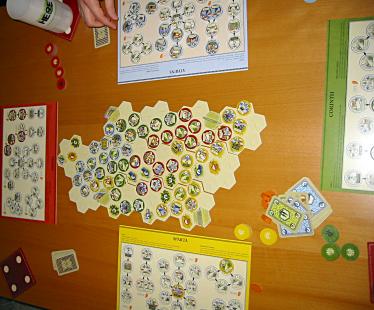
Scores
| PLAYER | SCORE |
| Player 1 | ??? |
| Player 2 | ??? |
| Player 3 | ??? |
| Player 4 | ??? |
| Player 5 | ??? |
Michelle Teague won this game.
I took a pretty quick dislike to this game on this, my first playing of it, for a couple of reasons. First, it seemed like it was often expected for one player to attack another player without any benefit to himself. I tend not to like this aspect in games. Second, it seemed that of the two routes to victory, one was only possible if no one moved to stop you in time, which would only happen if people weren't paying attention to you (or had expended so many resources stopping other people on the verge of winning before you that they couldn't stop you). I prefer to have the feeling of winning thanks to my own good play rather than the poor play of my opponents.
However, the outcome of the game made me objections during the game seem ill-founded. There was a point in the game where Michelle selflessly attacked me to prevent me from winning, even though she could have left this odious task to Tim and left herself in a better position. I thought this was a pointless and self-defeating move, but it turned out she won so perhaps there was something she gained by her attack on me. Perhaps it put the seed in others' minds that she was in a poor position so we were less likely to notice when she approached victory.
Also, Michelle won via the route that requires inattentive opponents, but to do so she had to set up a clever position where there were two ways for her to win, one of which was subtle and overlooked by her opponents. Still, if we'd been experienced, she probably wouldn't have gotten away with it.
So, it's possible my intuition about Attika is wrong and it's actually a good game. Perhaps it would be better playing it again with more experience myself and with more experience among my fellow players. For instance, Chad suggests that the route to quick victory over inattentive opponents is almost never used among experienced players, since they wouldn't expect to get away with it. This, in turn, might make it less likely one player would have to cripple himself just to prevent the next player clockwise from winning.
--Jay_Lorch?
Game: Starship_Catan?
Players: Ben Sklar, Steve Dupree
Location: DR
Time: ?
Winner: Steve Dupree
Prize: MS-Windows PC game/demo
Scores
| PLAYER | SCORE |
| Steve | 10 |
| Ben | 9 |
As you can see, it was a very close game. Ben took an early lead in colonies as well as trading posts, while Steve headed for the level II module upgrades.
--Steve_Dupree?
Game: Hanging_Gardens? (piecepack game)
Location: ?
Time: 7:30-8:30
Winner: Chad and John
Prize: MS-Windows PC game/demo (Chad), metal "Flapdoodle" puzzle (John)
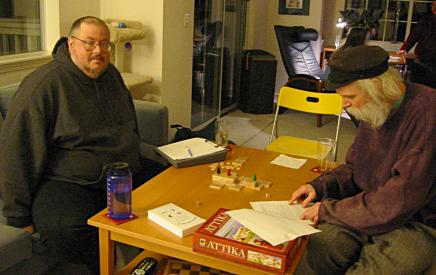
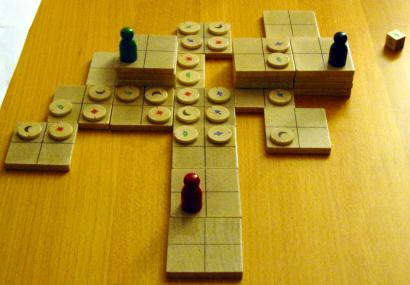
Scores
| PLAYER | SCORE |
| John Braley | 19 |
| Chad Urso McDaniel | 19 |
| Ron Hale-Evans | 13 |
I played a game of wiki:Piecepack:HangingGardens (by James Kyle) with John Braley and Chad Urso McDaniel. It was the second or third time I had played it, but the first time for John and Chad. All three of us enjoyed the game a great deal, but agreed that the sight line rules still need clarification.
John compared Hanging Gardens to AlienCity, which is high praise from him. He likened the early portion of Hanging Gardens to the initial period before the board "crystallises" in Alien City, while players are still unsure who will benefit from the placement of the pieces.
Chad remarked that one important tactic in HG is to spoil the colour symmetry in rows with which your gazebo (pawn) is not aligned. The colour symmetry rules reminded me of the game Entropy, with each player playing both Chaos and Order at the same time, for different rows of coins. However, I thought (and Chad and John agreed) that it was a little too easy to spoil the symmetry of a row in which you have no interest. In Entropy, Order gets points for any symmetrical subgroup of the group in question. In Hanging Gardens, on the other hand, you are forced to count every flower bed you can see in a row. Symmetrical subgroups don't count; if the group in your field of vision is not symmetrical as a whole, you score nothing for symmetry. This makes symmetry very fragile and hard to obtain; the seven-coin group GGRBRGB would score seven symmetry points, except that the two end flower beds don't match. It would be nice if symmetry were a little more robust and played a larger part in the game; at the moment, you have very little ability to block someone from breaking the symmetry of one of "your" rows.
There's also a weird Icehouse thing going on wherein string, dental floss, and laser pointers may be needed to determine whether a gazebo can "really" see a flower bed. The present "debatable bed visibility" calculation ("A particular bed is obscured by a plateau unless its distance from the plateau is equal or greater than the following: the product of the bed's distance from the gazebo multiplied by the plateau's height all divided by the gazebo's height. Ignore any remainder.") doesn't help much, in our experience. Our scoring ended up being fairly rough and ready, and we had to calculate some scores several times before we were all satisfied.
Other comments:
I was considered a threat early in the game. Chad said, "Ron's the enemy!" and I remarked that it was nice to be the enemy for once. However, John and Chad both caught on that all else being equal, you should move your gazebo as far back and as high up on the board as you can, so that it can see as many coins as possible. Seen from this angle, as it were, the game becomes a race to grab a good position and hold it. Again, the game would be more interesting if some of the other tactics were strengthened, such as the symmetry rules. Fortunately, this is only version 0.2b of the ruleset, so it seems James intends to improve the game.
Still, Hanging Gardens is worth playing as-is. If you like the commercial games Entropy, Torres?, Icehouse, or Pueblo?, or the piecepack game AlienCity, chances are good you will like Hanging Gardens a great deal.
John won a metal "Flapdoodle" optical illusion puzzle, and Chad selected an MS-Windows PC game CD from the Seattle Cosmic PrizeBag.
--Ron_Hale-Evans?
Game: Industria?
Players: ?
Location: ?
Time: ?
Winner: Steve Dupree
Prize: Jyhad? deck
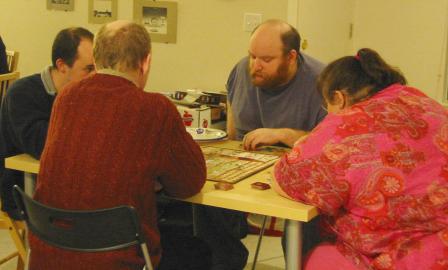
Scores
| PLAYER | SCORE |
| Player 1 | ??? |
| Player 2 | ??? |
| Player 3 | ??? |
| Player 4 | ??? |
| Player 5 | ??? |
I whined a fair bit, and made some definite mistakes. But in the end my four games worth of experience from last GN, twice as much as the rest of the players combined, was enough to enable me to win.
The core strtegy of this game is picking items to auctions that you are pretty sure other players will bid on. This is possible to do because money is public, so you know who can afford to bid and still build what they've bid on, and most buildings and technologies have already been built so it's visible who will get a 3 point bonus or what have you for the item in question. You also have to judge the risk/reward ratio, because if you only pick items to auction that you know will be bid on, you probably won't win; you have to take chances sometimes, and sometimes you will be wrong and will lose your auction or an important tile.
Comments from the other players?
--Steve_Dupree?
Game: Atlantic_Star?
Players: ?
Location: on the floor, in front of the bathroom
Time: 21:45 (game 2)
Winner: Alex Rockwell and Dave Howell
Prize: Jyhad? deck (Alex)
Scores, Game 2
| PLAYER | FLEET | SCORE |
| Dave Howell | Sun/Gear | 50 |
| Eric Yarnell | Propeller | 44 |
| Michelle Teague | Star | 36 |
| Jay Lorch | Anchor | 29 |
This was my first time ever to play Atlantic Star. I was already familiar with the mechanic by which the cards available for purchase on your turn rotate, becoming cheaper over time, from having played Witch_Trial?, a Cheapass game with a similar though, I think, more intriguingly developed mechanic. Apparently this is not the only game to utilize this interesting idea. Anyhow, I started off my Pacific cruise, which seemed to be the case with many people (starting with the larger cruises first). Everyone but Jay ended up with the yellow (I can't remember what sea that was for) cruise last. I thought I had the four start cruise sown up with a 38 value in it, but two people managed to pull out 42s (Dave and Jay I think). How annoying of them! I never had to take out a loan though, and still came in second. I only payed to sweep twice, once on my very last turn to try and boost my yellow score a bit (but it wasn't really necessary). Overall this is a pretty quick game, and there isn't too much delay as people consider the options, as it is basically very difficult to figure out the future or what other people are up to.
--Eric_Yarnell,_ND?
I thought I was doing really well at this game up until the very end. I was able to follow my standard strategies: Borrow heavily from the one-star and two-star cruises to support big scores in the four-star and five-star cruises. Avoid competing in the same color that the player on your right is working on. Finish the four-star and five-star cruises after others have so you know what you need to compete. But, in the end, even though I had about $24,000 available and all I had to do was find a decent green B, I found nothing! Cycling time after time kept bringing a sadder and sadder lack of green B's. This put me in last place. If I'd found a B-3, I would have been second, and if I'd found a B-5, B-6, B-7, or B-9, as I figured I'd easily be able to do with such an extraordinary amount of money, I would have won. But, it was not to be. I suppose I may have to rethink my strategies for nex t time , as I now realize you can't count on an enormous bankroll to be sufficient to come in first place in the cruise of your choice.
--Jay_Lorch?
Game: Star_Wars:_The_Queen's_Gambit?
Players: ?
Location: ?
Time: ?
Winner: Nat Dupree
Prize: ?
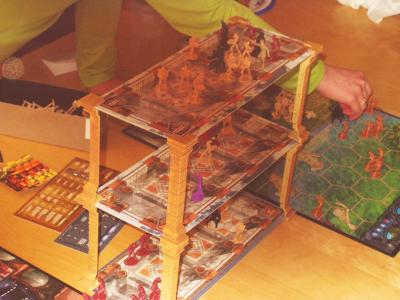
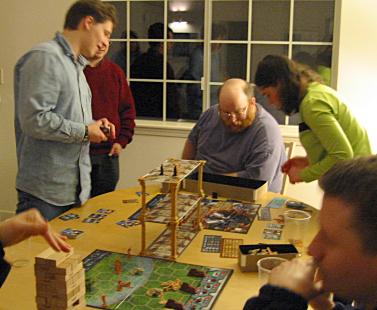
Scores
| PLAYER | SCORE |
| Player 1 | ??? |
| Player 2 | ??? |
| Player 3 | ??? |
| Player 4 | ??? |
| Player 5 | ??? |
What happened during this game?
Comments from the players?
--YOUR_NAME?
Game: Jenga?
Players: Jennifer_McGladrey?, ...
Location: DR
Time: 9:45ish
Winner: ?
Prize: ?
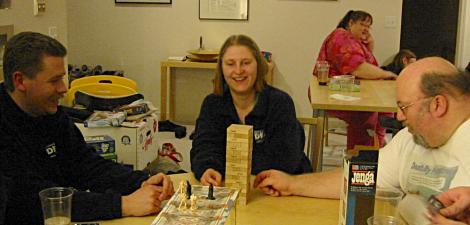
On observing the Jenga game, Chad commented, "We haven't played Villa_Paletti? yet, but we're playing Jenga. What's up with that?" Villa Paletti is the controversial Spiel des Jahres winner for 2002, for those who don't keep up with such things. (It is a dexterity game like Jenga. It beat out Puerto_Rico? and pissed a lot of people off.)
--Ron_Hale-Evans?
Game: Clans?
Players: ?
Location: DR
Time: 9:00ish-9:30
Winner: Marty Hale-Evans
Prize: ?
Scores
| PLAYER | SCORE |
| Marty Hale-Evans | winner |
| Chad Urso McDaniel | 1 point behind marty |
| Steve Dupree | 1 point ahead of John and Ben |
| John Braley | tied for last |
| Ben Sklar | tied for last |
What happened during this game?
Comments from the players?
--YOUR_NAME?
Game: Industria?
Players: ?
Location: ?
Time: ?
Winner: Steve Dupree
Prize: Robotic Tiger
Scores
| PLAYER | SCORE |
| Steve | 64 |
| Nat | 47 |
| Kane | 3rd place |
| Marty | Last place |
I got an early bonus when Kane got the shaft on the very first auction. Noone bid on it, passing the auction on to me and giving me a pile of money. I then was the starting auctioneer in the second round and grew my pile of money even larger. I used the money to buy income producing factories, giving me a fair amount of income throughout the game. Nat did extremely well with a Bank-Borse strategy, giving her an impressive score which surely would have won if I hadn't gotten lucky earlier. She had all but one of the bonus symbol tiles, and the factories to make significant use of them, to the tune of 22 points or so.
Comments from the other players?
--Steve_Dupree?
Game: Chess
Players: John Braley vs. Mark Haggerty, Mark Haggerty vs. Eric Yarnell, Mark Haggerty vs. Alex Rockwell
Location: LR
Time: 9:30 on
Winner: ?
Prize: ?
The John vs. Mark game was more of a tutorial for Mark's benefit.
After playing Chess, Eric sat in a comfy chair and began playing Civilization II on his PowerBook.
Comments from the players?
--Ron_Hale-Evans?
I also sat in on the John vs. Mark game, where I learned about the weakness of black's pawn structure in certain situations, and the intriguing fact that the player who is more cramped for space (almost always black) is better off exchanging pieces to help make more room available. I also learned some intriguing openings to deal with a queen or king pawn opening by white.
Anyhow, I tried one of these openings as black against Mark's white, but I was WAY too aggressive and also didn't really know how to develop this (to me) strange structure. So I got hideously walloped. How embarrassing. Oh well I had fun and I think helped cheer Mark up a bit.
Another important note for those who might have something to say about chess and Seattle Cosmic--let it be noted that Chess is played at Seattle Cosmic, and that the chess champion amongst us (John_Braley?) and the always to-be-feared Alex_Rockwell? are living proof that there is even really good Chess played at Seattle Cosmic.
Also note that Mark and Alex worked together to help teach Michelle the basics of chess. I think perhaps she also played a small game against Mark while he simultaneously played Alex.
--Eric_Yarnell,_ND?
Game: Chariots? (piecepack game)
Location: LR
Time: 10:30ish-11:30ish
Winner: Dave Howell
Prize: blue water bottle
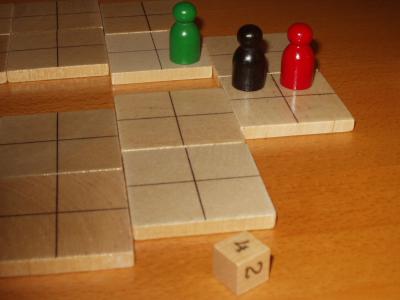
Dave's chariot (green) pulls ahead of Ron (black) and John (red) in the curve
Scores
| PLAYER | SCORE |
| Dave Howell | win |
| John Braley | place |
| Ron Hale-Evans | show |
The second piecepack game of the evening was wiki:Piecepack:Chariots by Mark Biggar. I played it with John Braley and Dave Howell. Dave immediately recognised the "impulse" movement system of Chariots as being similar to Car Wars, although (he said) the order in which players moved was closer to Ben Hvrt (another chariot race from Cheapass Games). Since Dave had played this kind of game before, while John and I hadn't, Dave acted as a sort of gamemaster, counting out the impulses and stating who had to move next.
As in a lot of race games (including Backgammon), there is a fair amount of blocking. My strategy was to play high numbers in the corners, even at the risk of crashing, and hope that by going around the outside of the track as quickly as possible, rather than slowly around the inside, I could catch up. Although I never crashed, my strategy failed; I came in third of three (but only by one space). Dave and John adopted more conventional "blocking game" rather than "running game" strategies and stuck to the inside of the track. We were all neck and neck until Dave pulled ahead on the first curve in the second lap, and slowly increased his lead from then on. At the end of the game, Dave was five or six spaces ahead, and I was one space behind John.
John probably would have done a little better but had several lousy die rolls. He thought that dice played too large a part in the game and came up with a splendid suggestion for a new piecepack component: piecepack dice cards, along the lines of the Deck_of_Dice?. Seattle Cosmic uses these frequently for Settlers_of_Catan?, and they reduce hurt feelings over bad die rolls considerably.
One problem we had while playing Chariots, although we had fun, was that it was hard to discern certain features of the board, such as the finish line, and especially where the insides and outsides of the turns were. Dave said this was a problem that came from playing with a generic GameSystem, and that if he played it again, he would make his own board with these features clearly marked. I said that it is a recent trend for piecepack rulesets to include printable playmats, and that two letter-sized sheets placed under the board would be sufficient. John suggested that dry-erase markers could be used on the wooden tiles to highlight the areas of the board, but you'll do that to my piecepacks when you pry them from my cold, dead fingers, etc. By the way, this was the first time John and Dave had seen the third-edition Mesomorph piecepacks, and John asked whether people might lose an eye during flicking games when pieces shot off the table because of the new super-slick coating.
Dave won a blue water bottle from the Seattle Cosmic PrizeBag.
--Ron_Hale-Evans?
Game: Zendo
Players: about 8 different players
Location: DR
Time: 11:30ish PM-1:30 AM
Winner: ?
Prize: ?
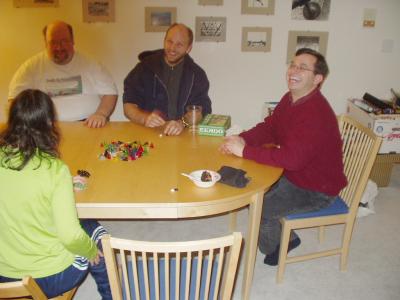
Scores
| PLAYER | SCORE |
| Player 1 | ??? |
| Player 2 | ??? |
| Player 3 | ??? |
| Player 4 | ??? |
| Player 5 | ??? |
The players in this game were, clockwise from the first master: Jay Lorch, Alex Rockwell, Nat Dupree, Steve Dupree, Michelle Teague, John Reiher, and Mark Haggerty.
The first master was Jay Lorch. His rule was "A koan has the buddha-nature if and only if it has at least three colors." It was guessed by Nat Dupree in round 2.
Nat Dupree was then the master. Her rule was "...if and only if its pip count is exactly five." It was guessed by Mark Haggerty in round 2.
Mark Haggerty was next. His rule was "...if and only if it contains no blue pyramids." It was guessed by Alex Rockwell in round 2.
Alex Rockwell then had the rule "...if and only if it contains an even number of green pyramids." It was guessed by Jay Lorch in round 2.
Steve Dupree was next, since Jay had already been master. His rule was the ridiculously hard but gloriously elegant "...if and only if there is a point above the table from which one of the pyramids cannot be seen." This rule necessitated the existence of a black pyramid, since that was the only non-transparent color, and it had to be able to completely obscure another pyramid from some angle. The rule was not only hard to guess, it was also hard to judge; for instance, a medium black pyramid next to a large green pyramid may or may not have the buddha-nature, depending on how far away they are. I lost count of the rounds that this one went. Mark Haggerty left in the middle of it all. It eventually degenerated, as most hard rules are wont to do, into a cooperative attempt by everyone to suss out the rule and the master eventually starting to give hints. Finally, after about an hour, Alex guessed the rule.
--Jay_Lorch?
Game: ?
Players: ?
Location: ?
Time: ?
Winner: ?
Prize: ?
Scores
| PLAYER | SCORE |
| Player 1 | ??? |
| Player 2 | ??? |
| Player 3 | ??? |
| Player 4 | ??? |
| Player 5 | ??? |
What happened during this game?
Comments from the players?
--YOUR_NAME?
Game: ?
Players: ?
Location: ?
Time: ?
Winner: ?
Prize: ?
Scores
| PLAYER | SCORE |
| Player 1 | ??? |
| Player 2 | ??? |
| Player 3 | ??? |
| Player 4 | ??? |
| Player 5 | ??? |
What happened during this game?
Comments from the players?
--YOUR_NAME?
Although a couple of people such as Tim Higgins left earlier, the main exodus really began around 12:30 and concluded at 1:30 AM when Ben turned into a pumpkin and kicked all the Zendo players out with little pumpkin feet. (The last koan of the Zendo game was extraordinarily hard and took about an hour and a half.)
Thanks for hosting, Ben!
--Ron_Hale-Evans?
Saturday, 7 February 2004, 5:00 PM at the house of David_Adams? and Kathy_Kizer? in Tukwila. Come play for fun and FABULOUS PRIZES from the PrizeBag!
Remember, Seattle Cosmic Game Night occurs every weekend, in one of three locations: Kent, Mill Creek, or Tukwila. Email Ron Hale-Evans for a full schedule and directions. If you come, please bring a snack or drink to share (cookies, chips, soda, juice, etc.)
GamesToTheRescue is a philanthropic project of the Center for Ludic Synergy and Seattle Cosmic Game Night. The aim of the project is to provide game equipment and a book of game rules to hospitals, for use by patients and visitors. You can support GamesToTheRescue by buying games via our Funagain affiliate program, buying Seattle Cosmic Gear, and in a number of other ways. See the GamesToTheRescue page for more details.